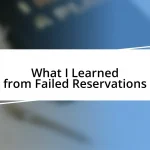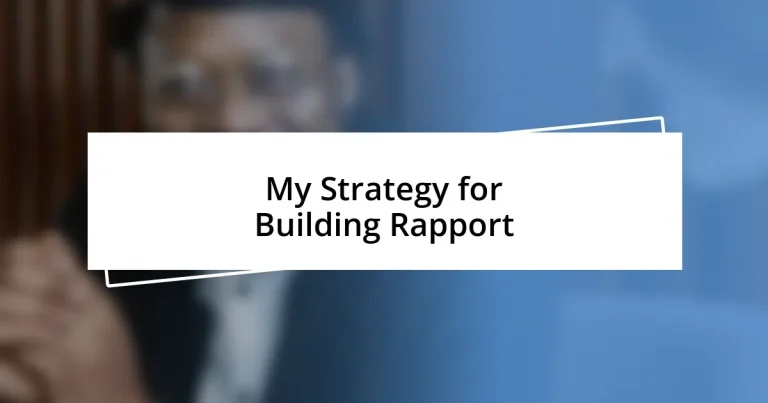Key takeaways:
- Rapport is essential for meaningful interactions, fostering trust and collaboration through active listening and empathy.
- Building trust involves being transparent, following through on commitments, and showing vulnerability in relationships.
- Nonverbal communication, such as eye contact and open posture, plays a crucial role in effectively connecting with others.
- Practicing empathy and recognition during everyday interactions enhances rapport and creates a supportive environment.
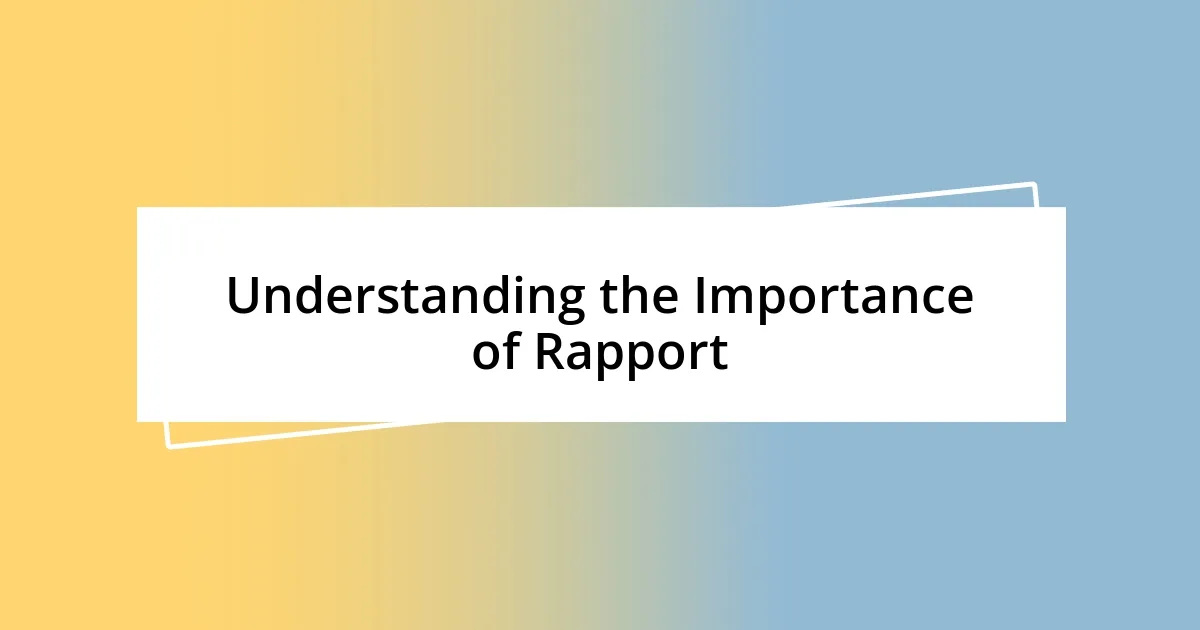
Understanding the Importance of Rapport
Rapport is more than a buzzword; it’s the foundation of any meaningful interaction. I recall a time when I was attending a networking event and struck up a conversation with a stranger. Not only did we exchange ideas, but I felt an instant trust; that connection led to a valuable collaboration down the line. Isn’t it fascinating how a simple conversation can open doors?
Building rapport can transform a mundane encounter into a memorable experience. Once, I helped a colleague navigate a tough situation by actively listening and validating their feelings. By really tuning in, our professional relationship deepened, and it taught me the power of empathy in forging strong connections. Have you noticed how being genuinely present can change the dynamics of an interaction?
Think about the last time you felt truly understood by someone. In that moment, you probably felt safe to share your thoughts freely. I’ve experienced this firsthand when clients open up during our discussions, allowing for deeper insight and collaboration. That’s the beauty of rapport—it’s the invisible thread that binds us, enhancing communication and fostering trust in every relationship.
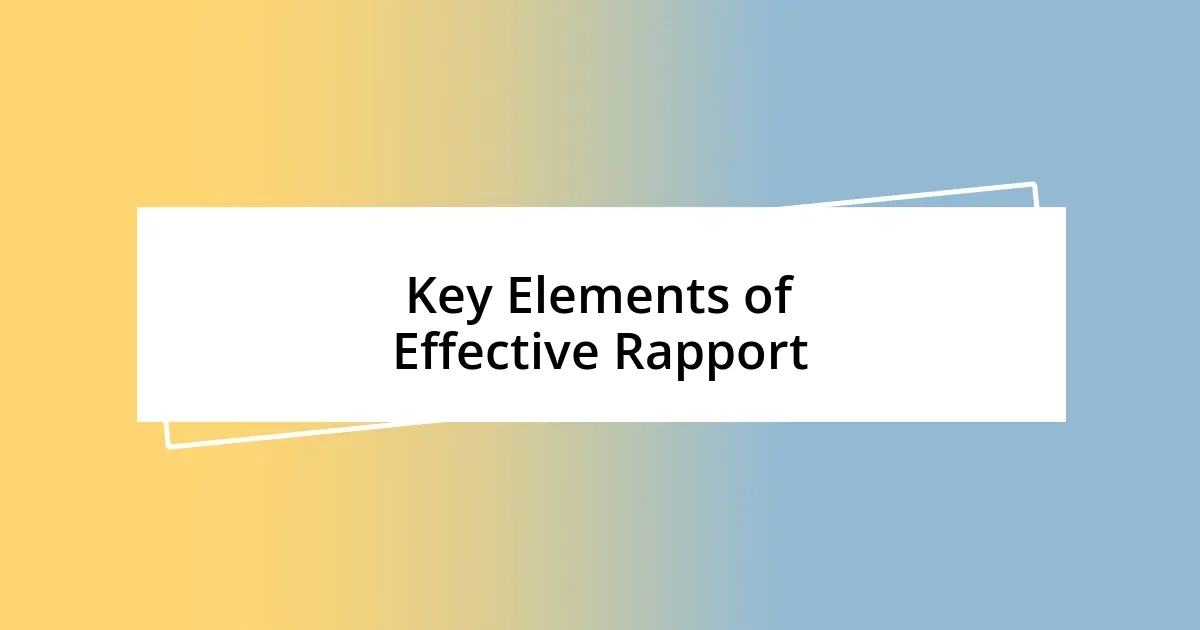
Key Elements of Effective Rapport
Establishing effective rapport hinges on key elements like active listening and empathy. I remember a conversation with a friend who was struggling with a personal issue. Instead of jumping in with advice, I realized that simply being there to listen was what she needed most. That moment taught me that showing genuine care can create a safe space for someone to express themselves fully.
Another crucial element is authenticity. I once met a client who was skeptical about discussing their needs with me. However, by sharing my own challenges and being transparent about my experiences, we moved beyond the business façade. I found that people tend to respond positively when they sense honesty; it’s amazing how this vulnerability can break down barriers.
Lastly, shared experiences play a significant role in building rapport. When I attended a workshop on team dynamics, I felt an instant connection with fellow participants over our shared learning journeys. This common ground created a bond that lasted well beyond the event, demonstrating how relatable experiences can foster deeper relationships.
| Key Element | Description |
|---|---|
| Active Listening | Focusing completely on the speaker, understanding their message and validating their feelings. |
| Authenticity | Being genuine and honest in interactions, which encourages trust and openness. |
| Shared Experiences | Finding common ground through relatable situations, which strengthens connection. |
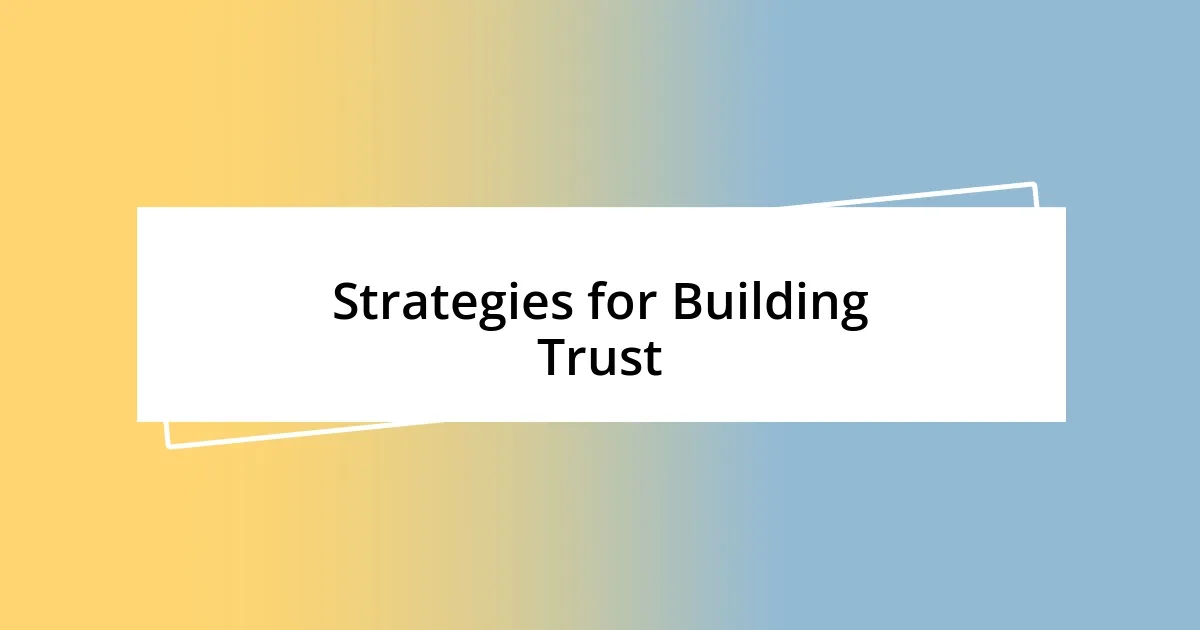
Strategies for Building Trust
Building trust is a nuanced process that requires intentionality. I remember when I started a new project with a tight-knit team. To gain their trust, I prioritized being consistent in my actions and meeting deadlines. That reliability sparked a sense of confidence within the group, allowing us to collaborate more freely. I’ve seen time and again how consistency serves as a cornerstone for establishing trust—when people can rely on you, it lays the groundwork for deeper connections.
Here are some effective strategies for building trust:
-
Be Transparent: Sharing your thoughts and decisions openly can foster a climate of trust. I find that when I explain my reasoning, others feel valued and included in the process.
-
Follow Through: Always deliver on your promises. I’ve learned that when I commit to something, I make it a priority. This builds credibility over time.
-
Show Vulnerability: Sharing my own challenges has often invited others to open up to me. It’s a reminder that we’re all human and makes the relationship more authentic.
-
Communicate Regularly: Keeping lines of communication open is crucial. I once initiated a weekly check-in with a colleague, which not only enhanced our trust but also improved our overall collaboration.
By embracing these strategies, you can create an environment where trust flourishes, enriching both your personal and professional relationships.
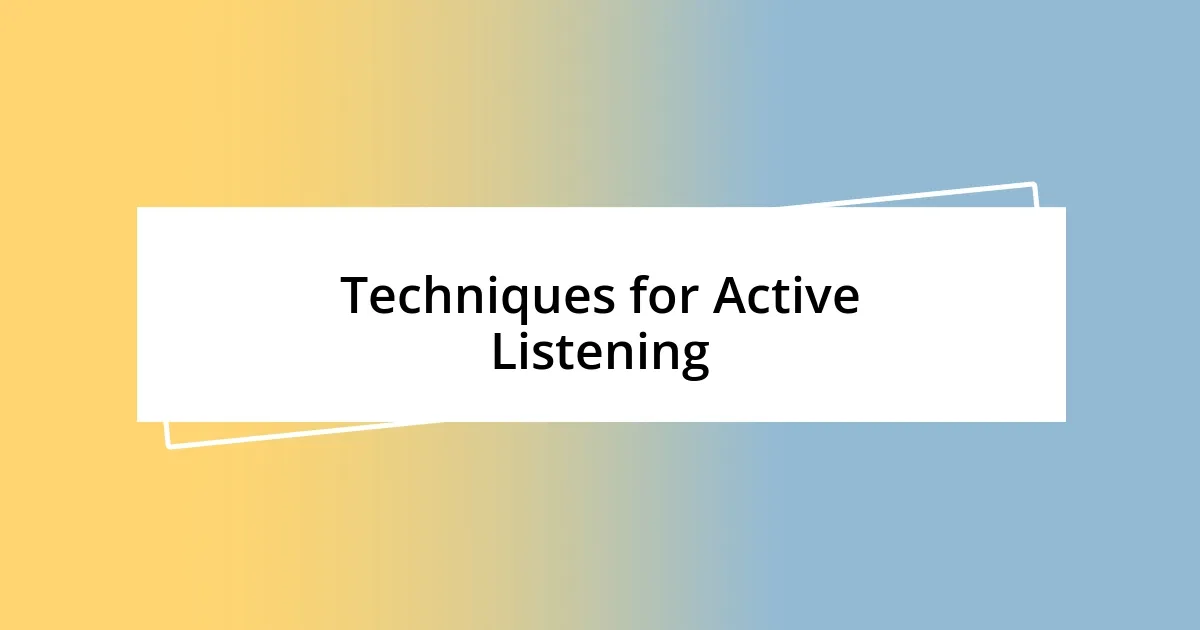
Techniques for Active Listening
Active listening is more than just hearing words; it’s about immersing yourself in the conversation. I once had a mentor who would lean in and nod, making me feel like the most important person in the room. That simple gesture transformed our dialogue, showing me how powerful it is to validate someone’s feelings through body language and focus. Have you ever felt truly heard? It feels incredible, doesn’t it?
Another technique I find immensely valuable is summarizing what the speaker has shared. After a long discussion with a colleague, I would often repeat key points back to them, ensuring I understood correctly. This not only reinforced my attentiveness but also encouraged them to add more depth or clarify their thoughts. It’s amazing how this practice can deepen the conversation and foster connection—who wouldn’t appreciate someone genuinely working to understand their perspective?
Additionally, asking open-ended questions can be a game changer. I remember chatting with a friend about her new job, and instead of asking, “Are you happy?” I asked, “What has been the most exciting part for you so far?” This shift led to a rich discussion, illuminating not just her feelings but also her aspirations and challenges. It’s these kinds of questions that invite deeper dialogues and strengthen relationships—don’t you think it’s enriching to learn what truly matters to someone?
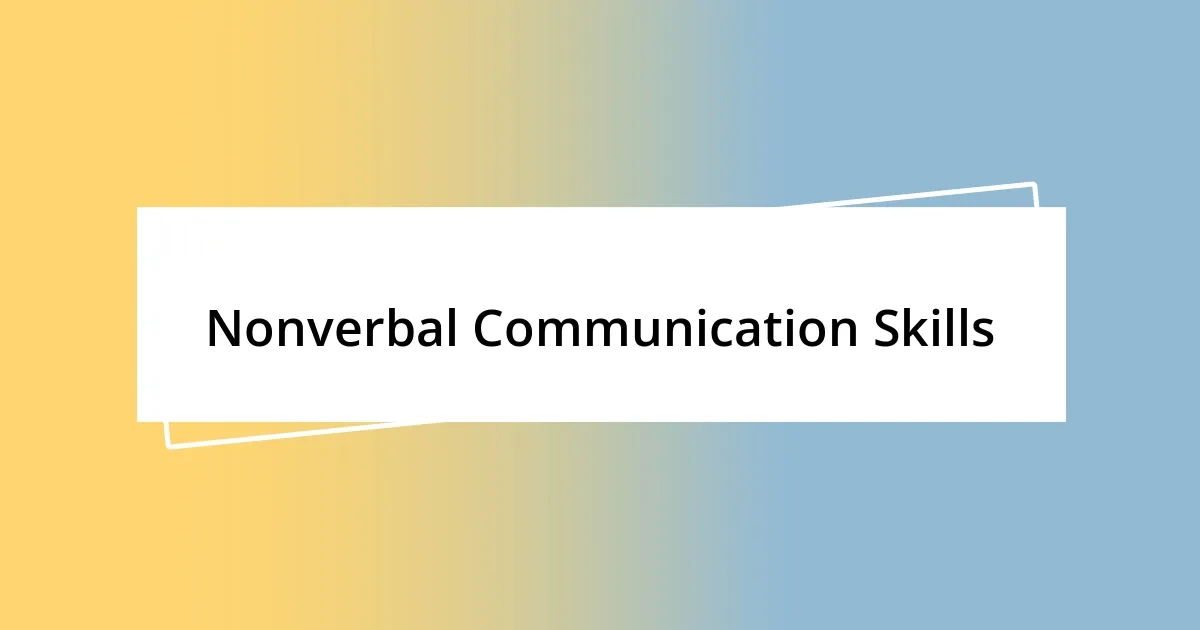
Nonverbal Communication Skills
Nonverbal communication plays a critical role in how we connect with others. I once attended a networking event where everyone seemed absorbed in their phones. However, I noticed one person who made eye contact and smiled genuinely while engaging in conversations. That subtle yet powerful approach drew people toward him, demonstrating that our body language—or the lack of it—can significantly impact rapport-building.
Facial expressions can convey emotions more than words sometimes. I vividly recall a meeting where I shared a challenging idea and, despite my detailed explanation, a colleague’s raised eyebrow and frowning face spoke volumes. It was a reminder that while my words mattered, the unspoken reactions could steer the course of our dialogue. Have you ever felt that disconnect? It can be disheartening when nonverbal cues clash with verbal communication.
Posture is another essential aspect. During a team brainstorming session, I made an effort to maintain an open and engaged posture. Leaning slightly forward and using hand gestures while speaking seemed to encourage others to share their thoughts more freely. It’s funny how something as simple as body positioning can create an inviting atmosphere—have you noticed how much more engaged people are when they feel your openness in the room?
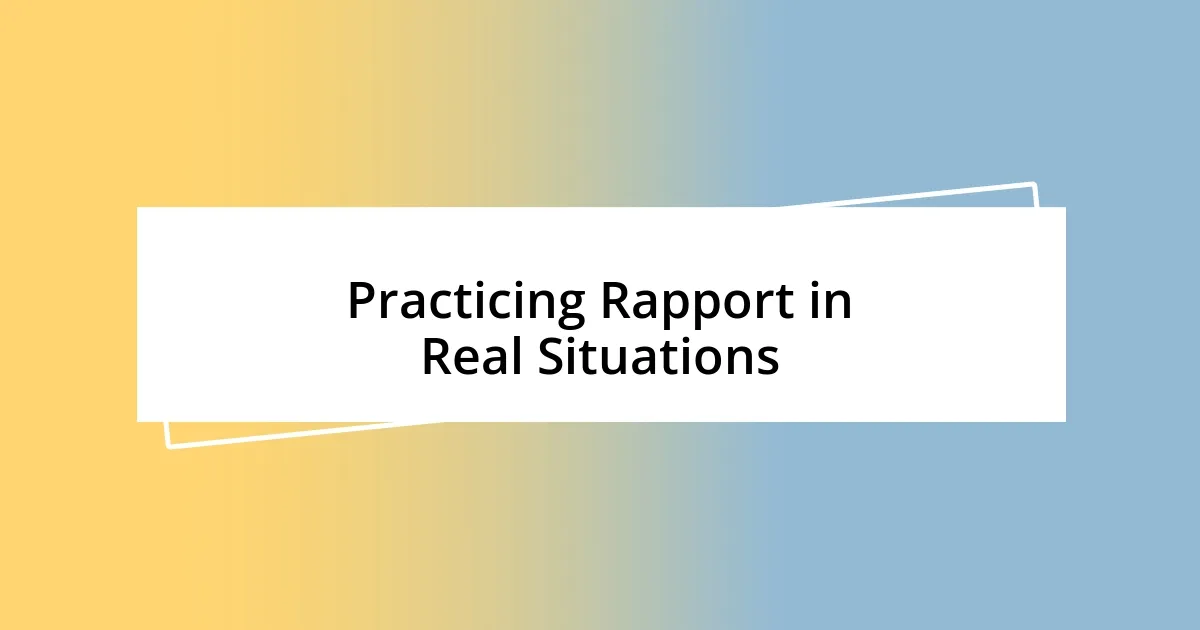
Practicing Rapport in Real Situations
Practicing rapport in real-life situations often starts in everyday interactions. I recall a casual coffee catch-up with a friend where I intentionally set aside my phone to focus entirely on our conversation. This small change made a noticeable difference; without distractions, our dialogue flowed effortlessly. Have you ever felt how refreshing it is to be fully present with someone?
Another memorable moment occurred during a group project. I made it a point to acknowledge each team member’s input, not just with words but with enthusiastic gestures. When I clapped my hands lightly after someone shared a great idea, it encouraged them to speak up more. This experience taught me that recognition can be a powerful motivator; don’t you agree that everyone wants their contributions to be valued?
I also find that practicing empathy can significantly enhance rapport. One day at work, a colleague seemed stressed about a looming deadline. Instead of diving straight into work talk, I asked how they were feeling about it. It turned out they needed a morale boost more than anything else. This willingness to connect on a personal level not only strengthened our working relationship but also created a supportive atmosphere in our team. Isn’t it amazing how taking a moment to acknowledge someone’s emotions can lead to deeper connections?

